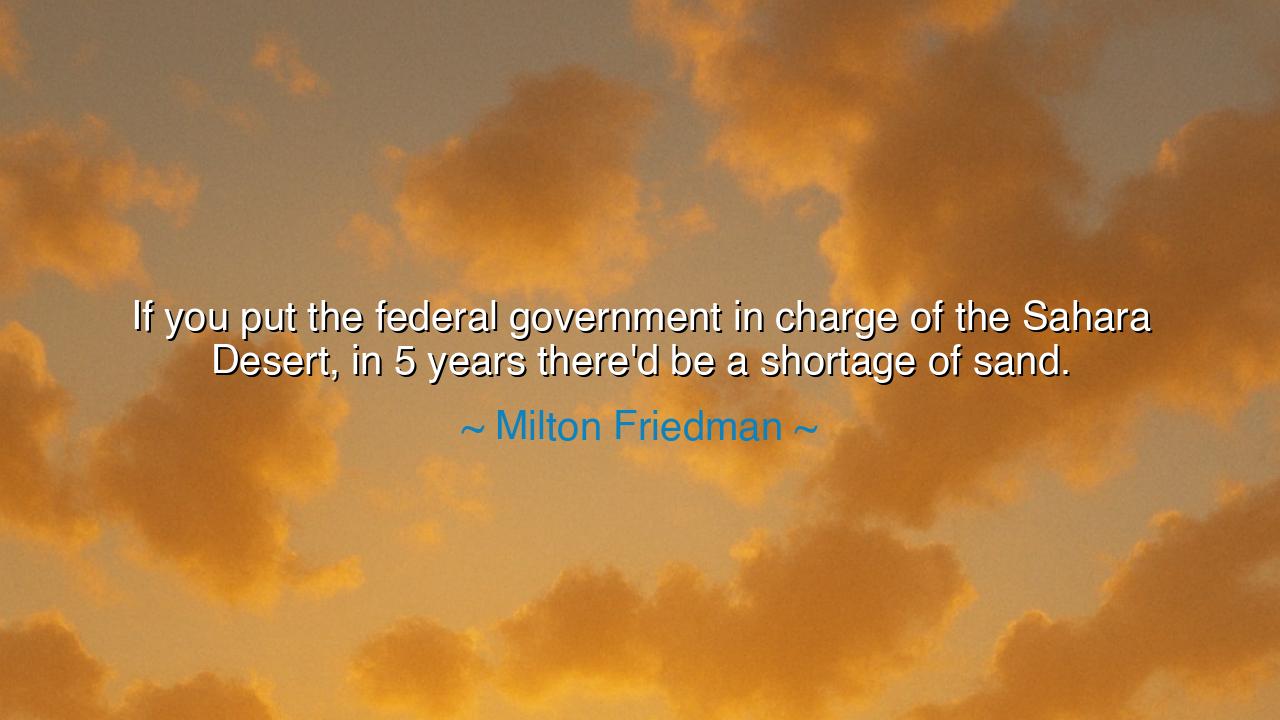
If you put the federal government in charge of the Sahara Desert
If you put the federal government in charge of the Sahara Desert, in 5 years there'd be a shortage of sand.






In the sharp and witty wisdom of the economist Milton Friedman, a truth was spoken that still echoes through the halls of every nation that worships bureaucracy: “If you put the federal government in charge of the Sahara Desert, in five years there’d be a shortage of sand.” At first glance, these words seem like a jest — a clever remark aimed at the inefficiencies of administration. But beneath the humor lies a profound reflection on human nature, power, and the limits of centralized control. Friedman, one of the great champions of economic freedom, spoke not to mock but to awaken — to remind his generation, and all who would listen, that governments, when given too much control, often destroy the very abundance they seek to manage.
The origin of this quote can be traced to Friedman’s long struggle against the swelling power of the state in the mid-twentieth century. He lived in an age when governments sought to regulate every corner of economic life — fixing prices, controlling industries, and redistributing wealth. He had seen firsthand how such efforts, though born of noble intention, led to waste, scarcity, and corruption. Through the imagery of the Sahara Desert, a place overflowing with sand yet ruled by nature’s balance, he illustrated the paradox of bureaucracy: that when human authority attempts to command what should be free, it suffocates abundance with red tape, inefficiency, and arrogance. The shortage of sand is the ultimate symbol of government’s power to mismanage even the simplest of things.
Throughout history, this pattern has repeated itself like the turning of the seasons. Consider the example of the Soviet Union, whose leaders believed that the genius of a few planners could replace the wisdom of millions of workers, farmers, and merchants. They drew their grand designs in offices far from the fields they ruled, dictating how much should be grown, built, or traded. But no plan, however intricate, could capture the complexity of human need. The result was famine in a land of fertile soil, poverty in a nation rich with resources — the state’s command had turned plenty into dust. Friedman’s quip about the Sahara was the same lesson spoken through humor: even if one were to place infinite sand beneath the hand of bureaucracy, scarcity would still follow.
Yet his warning was not born of contempt for government itself, but of love for freedom. Friedman believed that the true genius of civilization lies not in the orders of rulers but in the spontaneous cooperation of free individuals — the farmer, the craftsman, the merchant, and the dreamer. Where freedom is allowed to flow, innovation and prosperity spring forth like water from a desert well. Where power concentrates in the hands of the few, the wells run dry, for no bureaucracy can match the wisdom of millions acting in liberty. Thus, his words are not merely economic — they are moral. He asks us to remember that the heart of prosperity is not control, but trust: trust in people, trust in enterprise, and trust in the unseen harmony of a free society.
Let us recall too the story of Venezuela, a land once rich in oil — black gold flowing like rivers beneath its soil. In the name of equality and justice, the state seized control of its industries, promising to distribute wealth among all. But under the weight of inefficiency, corruption, and arrogance, production fell, markets crumbled, and hunger spread across a nation that had once been wealthy. It was, in living memory, a modern Sahara: rich in sand, yet starved by control. This is what Friedman warned against — the tragedy of good intentions left unchecked by humility and wisdom.
The lesson of Friedman’s words is timeless and stern: beware of the illusion that power can replace wisdom, or that control can create abundance. The federal government, or any government, must know its limits. Its purpose is not to command every grain of sand, but to safeguard the freedom in which each grain finds its place. Prosperity cannot be dictated; it must be allowed to emerge. The more a state tries to rule the natural order of markets and men, the more it stifles the very energy that gives life to them.
So, my child of the future, take this teaching to heart. Trust not in the omnipotence of institutions, but in the power of human creativity. Let governments protect justice, not dictate industry; let them build roads, not chains. Remember that scarcity often follows not from nature, but from interference — that wealth is born of freedom, and freedom is the mother of innovation.
And when you hear Friedman’s words — “If you put the federal government in charge of the Sahara Desert, in five years there’d be a shortage of sand” — smile, but do not dismiss them as mere humor. For within that jest lies the wisdom of ages: that the greatest danger to plenty is not drought or famine, but the heavy hand of those who think they can master what should only be guided. Guard liberty, therefore, as the wellspring of abundance — and the sands of prosperity will never run dry.






AAdministratorAdministrator
Welcome, honored guests. Please leave a comment, we will respond soon